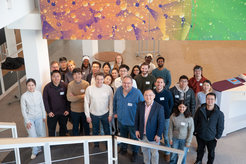Research project 2DPolyMembrane receives 10 Million Euro
Scientists from the Max Planck Institute of Microstructure Physics in Halle receive the prestigious Synergy Grant of the European Research Council to work jointly on 2DPolymembrane.
The European Research Council (ERC) has awarded a prestigious €10 million Synergy Grant to 2DPolymembrane, a research project aiming to develop ultra-thin, high-precision two-dimensional polymer membranes with transformative applications in energy and environmental science.
Prof. Xinliang Feng, Director at the Max Planck Institute of Microstructure Physics in Halle, acts as the corresponding Principal Investigator in this new research project, which unites research teams from the Technical University of Dresden and Leiden University in the Netherlands. “2DPolyMembrane” will be funded by the EU for six years, beginning in April 2025.
“This ERC Synergy Grant is a tremendous recognition of the collaborative work we’re doing to push the boundaries of 2D polymer membrane-based technologies. Our approach opens the door to breakthrough applications in energy storage and power generation. This research will push the boundaries of what’s possible, offering solutions that can lead to significant advancements in sustainability and performance across multiple sectors.”, said Feng looking into the future.
All team members from the Max Planck Institute in Halle, Technical University of Dresden, and Leiden University, Netherlands have profound expertise in the area of 2D polymer materials in physical chemistry and complement each other in this research project. Xinliang Feng will establish the novel synthesis of 2D polymer-based heterostructure membranes (2DHMs) with new design and synthetic strategies, and demonstrate the innovative integration of 2DHM membranes in aqueous battery devices. Thomas Heine, Principal Investigator from the Technical University of Dresden, will provide a detailed understanding of ion transport via a wide range of methods to enable the rational design of 2DHMs. Grégory Schneider from Leiden University, Netherlands, brings the surface chemistry component to tune ion flow and understand the ion transport phenomenon, as well as provide expertise across different aspects of the collaborative approach to maximize the success of this project.
2DPolymembrane will unlock the unique opportunities of 2DHMs for ion transport phenomenon and develop innovative energy device integrations (proton/aqueous metal batteries, fuel cells, and reverse osmotic power generators), where the merits of ultrathin precision 2DHMs will result in the highest selectivity and highest particle flow, and thus a fundamental device performance beyond the state-of-art. This project will achieve innovative 2DHMs for selective proton and ion transport with high permeance, laying the foundations for next-generation membrane technologies.
The majority of the grant will finance postdoctoral research fellows and Ph.D. students to collaborate at the participating institutions.
ERC Synergy Grant Kick-off Meeting Successfully Held
The kick-off meeting for our ERC synergy grant (2DPolyMembrane) was successfully held on 4-5 February 2025, marking the official launch of this exciting research endeavor. The meeting brought together our synergy team from MPG, TUD, and LU to discuss the research strategy, objectives, and roadmap. Through insightful discussions, the meeting set the stage for a productive research journey, fostering interdisciplinary collaboration and cutting-edge scientific advancements. We look forward to making groundbreaking discoveries and delivering impactful contributions to membrane technologies and sustainable energy devices.

